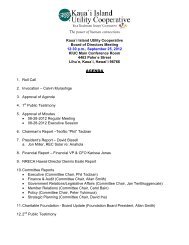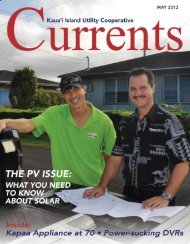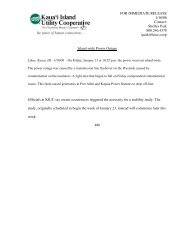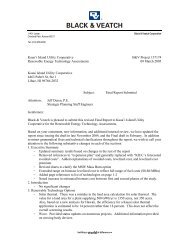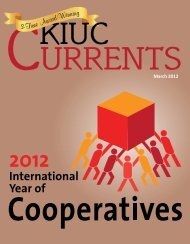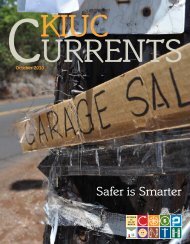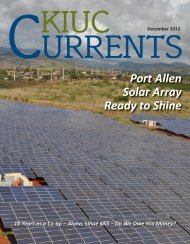KIUC's Rate Case - Kauai Island Utility Cooperative
KIUC's Rate Case - Kauai Island Utility Cooperative
KIUC's Rate Case - Kauai Island Utility Cooperative
Create successful ePaper yourself
Turn your PDF publications into a flip-book with our unique Google optimized e-Paper software.
Storm<br />
Sense<br />
A Practical Guide to<br />
Emergency Preparedness<br />
Before a Hurricane…<br />
Prepare<br />
The checklist provided will help you prepare for a<br />
hurricane. Don’t wait until a warning is given to begin<br />
making your plans. Have your survival kit ready. Know<br />
where emergency shelters are located.<br />
If you or a member of your family is receiving special<br />
medical treatment (such as dialysis or chemotherapy),<br />
know what the procedures are for emergency<br />
conditions. If you live in a flood zone or think your<br />
home won’t withstand the force of a hurricane, have an<br />
evacuation plan ready before a hurricane warning is<br />
issued.<br />
Prior to leaving home, turn off the electricity and gas.<br />
Take your survival kit; shelters do not provide food,<br />
bedding, water or other essential items.<br />
Provide for your pet. Contact the Humane Society for<br />
information on people/pet sheltering.<br />
Stay Informed<br />
When a hurricane watch or warning is declared, listen to<br />
the radio for further instructions. Kaua‘i’s Civil Defense<br />
station is KQNG, 570 AM or 93.5 FM, but all island<br />
radio stations are in voluntary compliance.<br />
KIUC personnel will be in contact with all three stations<br />
and will broadcast special advisories about your power<br />
supply. Oceanic Time Warner also broadcasts National<br />
Weather Service reports.<br />
During a Hurricane…<br />
Before heavy winds begin, turn off all switches on your<br />
electric circuit panel (usually located inside the home or<br />
garage) and turn off the switch for your main breaker<br />
(usually located outside near your meter).<br />
8 KIUC CURRENTS<br />
When a Hurricane is<br />
Forecast for Kaua‘i<br />
Once gale force winds are reached, Kaua‘i <strong>Island</strong> <strong>Utility</strong><br />
<strong>Cooperative</strong> (KIUC) will begin planned power interruptions<br />
to avoid damage to electrical equipment. Unplug electrical<br />
appliances and sensitive electrical equipments.<br />
Keep refrigerator and freezer doors closed as long as<br />
possible. Food may stay frozen in the refrigerator’s<br />
freezer compartment for 12 to 48 hours, and may stay<br />
frozen up to 72 hours in a fully loaded separate freezer.<br />
Do not be fooled by the calm sometimes experienced in<br />
the “eye” of a hurricane; stay indoors during and<br />
immediately after the storm. Going outside during the<br />
storm could put you and others who try to help you in<br />
danger. It also may hamper emergency crews.<br />
After A Hurricane…<br />
In Your Home<br />
Be sure your stove, washer, dryer, microwave and other<br />
electrical appliances—and the areas around them—are<br />
completely dry before attempting to plug, unplug, move<br />
or operate them (wait a week or two). If still unsure,<br />
contact a technician to inspect for damage.<br />
Check for food spoilage. Food that has warmed to room<br />
temperature probably is unsafe to eat. When in doubt,<br />
throw it out.<br />
Power Lines and <strong>Utility</strong> Poles<br />
When lines from utility poles are on the ground, assume<br />
they are dangerous. Don’t touch them. If someone is<br />
touching a line, don’t try to rescue them yourself and risk<br />
becoming a victim; get help immediately by calling 911 or<br />
KIUC’s Emergency Line at 246.8200.<br />
Beware, a fence or guardrail can be energized for a thousand<br />
yards if it is touching a downed power line. If a power line<br />
falls on your car while you are in it, wait for help, if<br />
possible. If you must get out, jump free of the car so that<br />
your body clears the vehicle before touching the ground.<br />
Using a Generator<br />
Before operating a generator, be sure your home is not<br />
connected to KIUC’s system where electric lines feed into<br />
the meter. Turn off the main breaker to your home<br />
before operating a generator.<br />
Have a qualified electrician install a special switch so power<br />
is properly supplied to the house without endangering<br />
family, neighbors and utility workers in the area.<br />
If your generator is being used to power an individual<br />
appliance or piece of equipment, make sure it is<br />
connected directly to your generator. This keeps the<br />
power safely isolated from any other wiring in your<br />
building or beyond.<br />
Follow the instruction manual to properly ground the<br />
generator. Make sure the generator location is properly<br />
ventilated to reduce the danger of fumes and overheating.<br />
Minimize the noise impact as much as possible. Store<br />
reserve fuel in a safe place away from the generator.








